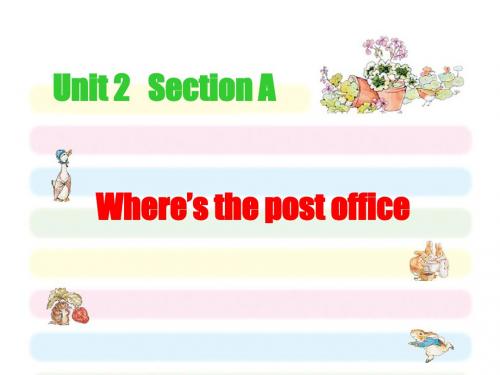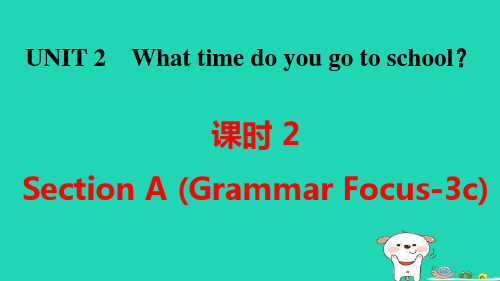新目标七下第二单元复件 Section A-3
人教版七年级英语下册教案Unit 2第三课时Section A (Grammar Focus-3c)

第三课时SectionA (GrammarFocus-3c)Step1 情景导入【参考案例】Teacher:Whattimedoyouusually…?Student1:Iusually…at…Teacher:Whattimedoeshe/sheusually…?Student2:He/Sheusually…at…Teacher:Whattimedotheyusually…?Student3:Theyusually…at…设计意图:通过师生谈话导入本单元的重点句型和语法基础知识,同时结合本单元的语法重点知识对学生进行听说训练。
Step2 畅通GrammarFocus回顾语法重点【操作案例】1.让学生分男、女两组朗读GrammarFocus中的内容。
2.让同学们背诵GrammarFocus中的内容。
设计意图:通过对语法基础知识的训练,让学生能够掌握并灵活运用本单元的语法基础知识,为完成3a-3c的任务作好铺垫。
Step3 完成教材3a-3c的任务【操作案例】1.让学生根据自己的实际情况回答问题并根据答语灵活运用whattime和when引导的特殊疑问句进行提问,并掌握频度副词always,usually和never的运用,完成3a的任务。
2.让学生两人一组分角色朗读3a中所提的问题与回答,巩固本单元的基础语法知识。
3.根据自己的实际情况,灵活运用always,usually和never,完成3b的任务。
设计意图:通过完成教材3a-3c的任务,进一步巩固语法基础知识,并运用所学的语言基础知识,循序渐进地培养学生的写作能力,让学生在实际操作中领会并掌握语法基础知识。
知识时间介词的用法(1)from…to…从……到……如:Wehavelunchfrom12o'clocktotwelvethirty.我们从12点到12点半吃午餐。
(2)atnight在晚上(3)inthemorning/afternoon/evening在上午/下午/晚上Step4 随堂练习根据句意及首字母或汉语提示填写单词或短语。
新目标七年级下Unit2 SectionA教学课件

4. The pay phone is on Green street.
5. The pay phone is in front of the library.
6. The pay phone is behind the library.
Listen and fill in the blanks with the words in the box. next to in front of between behind across from on 1. The library is between the restaurant and the
Turn left Turn right
park
Library
Bank
Hotel supermarket
Post office
Bridge
street
Pay phone
New
restaurant
street
MAP
Go straight
Turn left Turn right
park
Library
Bank
street
MAP
Go straight
Turn left Turn right
park
Library
Bank
Hotel supermarket
Post office
Where is
Bridge
streetthe hotel?
Pay phone
New
restaurant
street
MAP
Go straight
supermarket. 2. The park is across from the bank. 3. The supermarket is on Fifth Avenue.
初中英语人教版七年级下册Unit2 Section A 2d-3c

Unit2 What time do you go to school?Section A 2d-3c教材的地位及作用新目标英语教材的概述《新目标英语》教材的语言教育理念是知识用于行动,强调“语言应用”“培养创新,实践能力”,发展“学习策略”,它采用任务型语言教学(Task –based language Teaching )模式.教材中每个单元都设计一个或几个与该单元话题有关的任务,让学生在完成任务的过程中,使用英语获取信息,用英语进行交流,培养运用英语解决实际问题的能力。
单元分析及教材处理本课是新目标英语七年级下册第二单元,教材以: what time do you go to school”为中心话题,围绕着描述对Scott 的采访为线索开展各项语言训练活动,在语言能力方面,侧重让学生听记者与Scott谈论日常活动,并简单谈论他一天的活动,在语言知识方面,则侧重词汇,习语的储备和语法训练,并学习谈论时间的问句what time 和when …? 以及频度副词的简单用法。
教学目标根据《英语课程标准》关于总时间的具体描述,结合第二单元的教材内容,按语言知识,语言技能,学习策略,情感态度,文化意识,五个方面本课时教学目标细化:知识目标1.掌握新单词 never often job fifty work funny exercise2.短语 at night radio station work at /in from ..to ..3.句型What time do you …?I usually / never / always go to bed at…4. 语法:表动作频率的副词 always usually never技能目标:1.是学生通过小组对话表演,理解学生的合作能力养成相互帮助的习惯2.通过活动使学生养成良好的口头表达能力。
重点:1.频率副词的运用2.小组合作进行单词的学习与对话的表演难点:1.对话的理解与表演2询问时间的问句what time …?when …?的区别学情分析1.初一学生的抽象思维能力较低,形象思维能力强,但注意力容易激活本课以学生一天的活动展示,并配以时光飞逝的音乐背景,从而增强学生的兴趣和注意力。
人教英语 七下 Unit2 Section A 3a 3c 课件共25张

What do you want to be?
cook
What do you want to be?
What do you want to be?
What do you want to be when you grow up?
I want to be an engineer.
How are you going to do that? I'm going to study math .
teacher.
__a_ 5. Those boys want to be soccer
players.
__c_ 6. My friend and I want to be singers. __g_ 7. My cousin wants to be a cook.
__b_ 8. I want to be a race car driver.
Unit 2
I'm going to study computer science.
Section A 3a-3c
What do you want to be?
pilot
What do you want to be?
reporter
What do you want to be?
artist
What do you want to be?
He/She wants to be a bank clerk.
Why?
because it's….
Wants to be
Kelly policeman
Andy
Ken
reporter eporter
Why
dangerous and
(新)人教新目标版七下 Unit 2 Section A 课时2(3a~3c)教案

Section A第2课时〔3a~3c 〕类别学习重点重点单词best, group重点短语on weekends, go to work, on school days重点句式What time do you get up on school days?课前预习写一写 1.最好的best 2.组;群group译一译 1.在周末on weekends 2.去上班go to work 背一背在上学的日子,你什么时候起床?What time do you get up on school days?新课导入Teacher:I get up at six ten and run at six thirty, then I eat breakfast at seven, and I go to school at seven forty. I get to school at eight. I am never late for school. What about you? Can you tell me what you do at different time?新课展示【完成教材Grammar Focus的教学任务】让学生总结一般现在时特殊疑问句的用法,然后做练习题。
【完成教材3a~3c的教学任务】1.根据问题或答案完成对话,完成答题后小组成员互相交流,体会频率副词的用法。
2.列举自己的日常活动,进一步体会频率副词的用法。
【语法提要】1.never副词,意为“从不;决不〞;常置于be动词、助动词或情态动词后,行为动词前。
布置作业:教师引导学生课后完本钱课时对应练习,并预习下一课时内容。
Section B1 (1a-2c )一、教学目标:1. 语言知识目标:1) 掌握下列词汇:baseball, watch, computer game, ID card, notebook, ring, bag, library, lost, at, call理解下列词汇:ask, some, found, classroom, e-mail2) 掌握下列句型:— What’s this? —It’s a watch.— How do you spell it? — W-A-T-C-H.3) 能够使用目标语言询问东西的所属,或者寻找物品的主人。
人教新目标七年级下册英语课课练Unit2SectionA(2a-3c)

第二课时Section A (2d-3c)课堂导学导练1. work n. 工作worker 工人[辨析]job 与work两者作名词用,都可意为“工作〞,但二者用法有区别。
job 指具体的职业或零工,为可数名词,复数形式为jobs;work 指人们日常生活中和工作中从事的体力或脑力劳动,为不可数名词。
“一份工作〞应用“ a piece of work〞,女口T-(2),T二(1)2. exercise 的用法(1) 作动词,意为“锻炼;练习〞。
如T二(3),T四(2)(2) 作可数名词,指“一套动作,训练活动〞或“习题〞。
(3) 作不可数名词,泛指“运动〞。
3. group n意为“群,组〞。
女口T二(5)常构成短语a group of意为“一群/组〞,后面接可数名词的复数形式,谓语动词也应该用复数。
4. from... to...意为“从.•…到.•…〞用于连接两个时间或地点,也可以表示幅度或范围。
如T三(2)5. be late for..迟到。
女口T一(1),T三⑷课内根底训练一、单项选择( )1. Jack is a good stude nt in my class. He _____ l ate for school.A. usuallyB. alwaysC. neverD. ofte n .( )2. My aunt works at a radio stati on. It's an in terest ing .A. workB. jobC. exerciseD. weeke nd( )3. His mother ofte n gets up ____ 8: 00 Sun day morning.A. at;atB. on;onC. at;onD. on; at( )4. Bruce is my _____ frien d. I like him very much.A. freeB. happyC. bestD. in terest ing( )5. - ______ ?--lt's ten o'clock.A. What's that .B. What's the timeC. What time is itD. B and C二、根据句意和首字母提示写单词。
人教版新目标英语七年级下册Unit2教材解读-新版

人教版新目标英语七年级下册Unit2教材解读-新版Unit2教材解读1.0Textbook Analysis教材解读本单元以“日常作息习惯(Daily routines)”为话题,围绕功能“Talk about routines, Ask about and say times”,谈论日常作息习惯,谈论自己和询问别人一天的作息以及作息时间,学习What time,When一般现在时态的问句和表示频率的副词。
Section A在内容上侧重让学生听Scott采访Rick和Jim兄妹谈论日常活动,并能简单谈论自己一天的活动。
侧重在话题牵引下的基本词汇储备和语法训练,重点学习小时加分钟的表达法,学习谈论时间的问句“What time...? When...?”。
Section B继续在话题牵引下对Section A在知识层面上的深化和拓展,介绍更为复杂的时间表达法(to和past);语言技能方面在进一步训练、发展听说技能的基础上,重点转向读写技能以及语言综合素养的培养和提升。
1.1Section A 1a 活动1a是一个基于话题的主要词汇和基本句型引入活动,通过主题图导入话题牵引下的核心词汇。
此部分以由旧到新的方式呈现:7上学过的词块是“go to school, eat breakfast”, 本单元新出现的词汇“get up, get dressed, brush teeth, take a shower”;所列日常活动以词块的形式整体出现,便于整体输出;还通过例句初步感知基本句型:“What time...? I ...at...”。
1.2Section A 1b-1c 活动1b-1c是Listening and speaking部分。
引导学生通过观察1a主题图的活动,引导学生观察理解日常活动和活动的时间,让学生感知谈论日常活动的基本句型和时间表达法,预测1b 中几个小对话中关于日常活动所匹配的时间。
Unit2SectionAGrammarFocus3c课件人教版七年级英语下册

Activities
Name1: ______
Name2: ______
Name3: _____
get up on weekends exercise
eat dinner
take a shower go to school
Words
Sentences
I我al总wa是y6s:h30a吃ve早b餐re。akfast at six thirty. always
Summary
• A:What time do you usually get up? thirty.
B: I usually get up at six
• A: What time does Rick eat breakfast? o’clock.
B: He eats breakfast at seven
人教新目标Go For It七年级英语下册
Unit2 what time do you go to school
SectionA Grammar Focus-3c
Proverbs:
Time is money. 一寸光阴,一寸金。 Time is life. 时间就是生命。 Time flies. 时光如梭 Time and tide wait for no man. 时不我待!
辨相析 同w点h:at 二tim者e 都和表wh示en“___什__么__时__候_______” 不同点:what time用来询问____具__体__的__时__间__点_____
when既可以用来询问____具__体__的__时__间__点_,还可用来询问__时__间__段_____。 具体用法: 1.对时间状语提问时,有时两者可以互换。
英语新目标七下第二单元Section

英语新目标七下第二单元Section B 3a -3b 课程设计,蔺校点评及自我反思课题:英语新目标七下第二单元Section B 3a -3b课前说明:1.原来计划做好3a _ self check 利用一个课时来完成,但实际上是只完成了3a -3b 内容。
2.上一个课时已经浏览了3a 的短文,并强调了形容词表语的作用。
课程设计流程:1. 复习四个小句子改错。
2. 3a 课文能背下的背,背不过的同学可以看书来读。
3. 屏幕上打出短文并画出几个重点,让四人小组来通论解决他们分别得用法。
4. 学生起来讲解用法,每人讲一个,其他同学来补充。
先讲的同学可以在三个语言点中先选一个,基本是每个大组都有一次这样回答问题的机会,第四大组就要在短文中再自己讲一个新内容。
设计意图:让学生真正的活动起来,学生讨论讲解提升能力,包括语言表达,思维能力,交流讲解能力。
老师选出最重要的三个,也让同学们再准备我的内容的基础上找出其他内容来准备,这样可以发散学生的思维,同时也不会由老师牵着学生走。
本环节反思:由于从本单元开始语言点慢慢的增加,从现在开始准备,为初二和初三语言点,考试点的学习打下基础。
而本节课是我第一次的尝试。
学生的表现让我很欣喜,他们完全可以独立初步解决这样的知识,有些地方可能还是有这样那样的不足,但是结果令人满意。
这样在这一届学生中这样的尝试就提前了大约两个月。
5,做3b。
重点把握 a good place to have fun.6. 综合3a 3b 重点内容,让同学们来练习,主要是以突出汉译英。
测试新内容把握情况。
优点:初步尝试学生自己解决知识点的任务基本完成,效果不错。
学生活动效果还不错,积极性调动也可以不足:由于是一节平时课,又是一个语言点涵盖比较多的地方,显得多少有些放不开。
蔺校点评:教学节奏把握的很好,整节课学生要学习的点是挺多的,但感觉不出太累或倦怠,这就有赖于教师的教学节奏,教学形式的变换、语言速度的变化、读写听的结合等等,拿捏的很好。
人教新目标七年级英语下册 课时练习 Unit3 第二课时Section A(3a-3c) 含答案

课时训练Unit 3第二课时Section A (3a-3c)一、根据句意和汉语提示填单词。
1. My father goes to work at eight o’clock every(每)day.2. --Mike , can you ( 开车)?--No,I can't.3. How long does it take you (做)your homework?4. --Where does your uncle ( 居住)?--In Shanghai.5. My father always drives his _( 小汽车) to work.二、用所给词的适当形式填空。
1.- How long does it take you ( walk) to the train station?--About twenty minutes.2. - What about ( play ) basketball?-Good idea.3.It's about ten ( kilometer) from my home to school.4. Mike lives ( live) in Beijing with his parents.5.--Does he need about half an hour ( get)home after school?一Yes , he does.三、单项选择。
( ) 1. It's about walk from my home to school.A. ten minutesB. ten minuteC. ten minute'sD. ten minutes'( )2. - How does Mary get to school?一She gets to schoolA.by a busB.take a busC. takes a busD. by bus( )3.- Excuse me , Sir. is it from here tothe nearest shopping mall?- Well , only about five minutes ' walk.A. How oftenB. How longC. How farD. How soon( )4.-_ does it take you to go to the park by taxi? -- About 30 minutes.A. HowB. How farC. How longD. How many( )5.It will you about thirteen hours to flyto England from Hong Kong.A. spendB. takeC. useD. pay四、句型转换,每空-词。
七年级英语下册Unit2课时2SectionAGrammarFocus_3c课件pptx人教新目标版

一
二
三
四
3. Who is your best (good) friend in your class? 4. When does the boy get (get) dressed? 5. Ann never plays (play) computer games at school.
一
二
三
四
exercise, work, she, shower, get,never, early, class, music, always
21. Her
students love her. They say she is
22. always kind and teaches them very well. Miss Zhang has
school.
A. never; for
B. never; to
C. always; for
D. always; to
一
二
三
四
( D )13. He
the first class at 8:00 in the morning.
A. usually have
B. have usually
C. has usually
一
二
三
四
exercise, work, she, shower, get,never, early, class, music, always
Miss Zhang is busy every day. She is an English teacher. She
16. works very long hours every day. She gets up 17. early in the morning. She 18. exercises at 6:15.
- 1、下载文档前请自行甄别文档内容的完整性,平台不提供额外的编辑、内容补充、找答案等附加服务。
- 2、"仅部分预览"的文档,不可在线预览部分如存在完整性等问题,可反馈申请退款(可完整预览的文档不适用该条件!)。
- 3、如文档侵犯您的权益,请联系客服反馈,我们会尽快为您处理(人工客服工作时间:9:00-18:30)。
e.g: The man gets dressed and goes out.
这个男人穿好衣服然后走出去。
It’s cold outside. Put on your sweater, Daming. 外面天冷。穿上毛衣,大明。
小结:
dress既可表示动作,又可表示状态,常 由人作宾语,意为“给„„穿衣服”。当 dress表示状态时,一般要用be dressed in的形式。如:
(上学期间,在上学日)
I always/usually/never get up at...on school days.
2.What time does Rick get up? Rick always gets up at 6:20. 3.What time do you have breakfast? I always/usually/never have breakfast at ….
Name: ___
get up on weekends exercise eat dinner take a shower go to school
Name:___
Name:___
In our group, Li Fei usually gets up late on weekends, She gets up… .
Rick usually goes to school at about / around 7:00 a.m.
1. It’s time for sth.=It’s time to do sth. 该做某事了/到了做某事的时间了 2. It’s time for sb. to do sth. 某人该做某事了/到了某人做某事的时间了
She exercises running every afternoon. do morning exercises
做早操
eye exercises
眼保健操
表示体育锻炼时不可数;表示练习时可数 do exercise 是不可数名词,表示进行体育锻炼,或 锻炼身体 do exercises是可数名词,表示做练习或作习题,比 如学习上或优育上或音乐等方面的练习 如:He always does exercise in the morning. 他 经常晨练。
She is dressed in a red coat. 她穿着一件红色的上衣。 而put on着重于“穿”这一动作,即由没 穿到穿这一过程的完成,意为“穿上”。
1. The small child is not enough to _____ B himself. A. have B. dress D. put on
3c Interview(采访) three of your at time they do these activities. Then give a report to the class. Student 1 Student 2 Student 3
Unit 2
What time do you go to school?
Section A
Period 3 (2d – 3c)
A: What time does he get up ?
B:He usually gets up at 6 o’clock.
take a shower
What time does he usually take a shower? He usually takes a shower at ten past ten.
1. get dressed 穿上衣服
dress v. 给„„穿衣服
例如:
Could you dress the child for me?
你能不能替我给小孩穿上衣服?
Can the little boy dress himself now? 这个小男孩现在会给自己穿衣服了吗?
dress和put on 的区别
exercise v.&n.锻炼;练习
I exercise every day. He usually exercises after school every day. exercise doing sth. 练习做某事
exercise speaking English exercise playing the piano
job 是可数名词意为“工作,职业”
例如:
He is out of job. 他失业了。
I have many jobs for you to do.
我有很多工作让你做。
辨析:work / job job: 作“工作”解,特指“雇佣性质的 工作,是可数名词。 work: “工作,劳动”,指一般的工作, 是普通名词,且不可数。 例句: He is looking for work now and he wants to find a job suitable for him. 他现在正找工作并且想找一份适合自己 的工作。
what time用来提问时刻,只能 提问几点钟几分几秒 when可以提问除了星期几以外 的所有时间,包括年月日、几 时几分几秒,可以把what time 替换掉
what time 故名思义,是问具体的时间的,而when 指大体的时间。 举例:what time shall we meet? 我们几点见面? when shall we meet? 我们什么时候见面?
我父亲早上总是起床很早。
usually
通常
He usually goes to work by bus.
他通常坐公交车去上班。
never
从不
Linda is never late for school.
琳达上学从不迟到。
always
总是,一直
usually
never
通常
从不
Write about something you always do, something you usually do and something you never do.
a job 一份工作 an interesting job
一份有趣的工作
Scott has an interesting job.
斯科特有一份有趣的工作。
job与work: 1.job, 可数:I have a job as a teacher. Jobs are not easy to get. 2.work, 不可数:I cannot find work in this town. Have you finished your work?
Eg:1.该吃午饭了。
It’s time for lunch.=It’s time to have/eat lunch.
2.到了你做家庭作业的时间了。
It’s time for you to do your homework.
be late for… 迟到
Tom is late for school.
她在广播电台上班。
radio 广播,电台 radios 收音机
from …to… 从……到……
She works from 7:00 to 9:00.
她工作从7点到9点。
8:00p.m.
eight o’clock at night/in the evening
about / around 大约、大概
A 2. They are going to ______ the boy in new clothes and take him to the park. A. dress B. have on D. put on
2. Scott has an interesting job. 斯科特有一份有趣的工作。
4.What time does Anna eat breakfast?
Anna never eats breakfast.
5.What time does your friend go to school?
He/ She always/usually/never goes to school at …
eat breakfast
What time does she usually eat breakfast? She usually eats breakfast at six thirty.
A: What time do they brush teeth ?
B: They usually brush teeth at six ten.
At about ten twenty At eleven o’clock Go to work Radio show From twelve o’clock at night to six o’clock in
always
一直, 总是
3a
My father always gets up early in the morning.
go to school
What time do they usually go to school? They usually go to school at seven.
2d Role-play the conversation.
Read the conversation in 2d, and fill in the blanks. Activities
work 还可以做动词,意为“工作”, 而job不可做动词。 Jack works very hard.杰克工作非常努
力。
I work eight hours every day. 我每天工
作八个小时。
radio station
广播电台
在广播电台:
at the radio station
